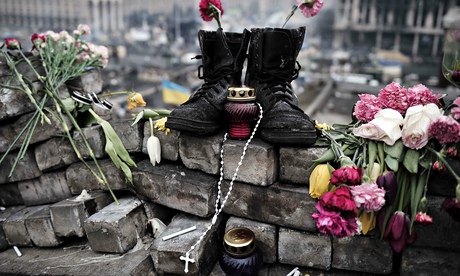On 20 February, as revolution engulfed the centre of Kiev, Joseph Schilling, a 61-year-old builder from western
Ukraine, went to the frontline to join the protests against President
Viktor Yanukovych's
government. He was standing beneath the neoclassical October Palace –
once a girls' seminary and later the HQ for Lenin's secret police – when
a sniper shot him in the head.
The place where Schilling died is
now festooned with flowers. There are carnations, tulips and a tub of
spring crocuses. Schilling's photo, near his barricade, reveals a man in
late middle age wearing a tie, his hair neatly combed. Here too are
images of other members of the "Heavenly Hundred" –
the name given to the 102 protesters who have perished near the Maidan, Kiev's central Independence Square.
The
Kremlin describes last month's uprising in next-door Ukraine as an
illegitimate fascist coup. It says dark rightwing forces have taken over
the government, forcing Moscow to "protect" Ukraine's ethnic Russian
minority. The local government in Crimea is preparing for a referendum
on Sunday which could lead to
Russia annexing the region. Yanukovych, meanwhile, has fled to Russia.
Schilling,
however, was an unlikely fascist. A father of two daughters, he and his
wife Anna had lived in Italy. They had four grandchildren. Moreover, he
was Jewish.
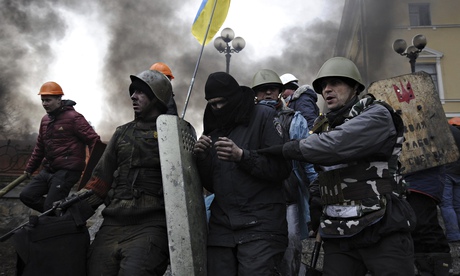 Anti-government protesters lead away a riot policeman in
Independence Square on 20 February, the day that Joseph Schilling died.
Photograph: Reuters
Anti-government protesters lead away a riot policeman in
Independence Square on 20 February, the day that Joseph Schilling died.
Photograph: Reuters
With Ukraine on the brink of invasion and division, most people in
Kiev blame the country's troubles on the former president. "This is
Yanukovych's fault," Zhenia, a pensioner, said, surveying the
battleground in Institutska Street, where many were gunned down. She was
crying.
Nearby, visitors bowed before makeshift brick shrines,
some decorated with gas masks and helmets. Others crossed themselves.
One child's drawing said: "Eternal glory to the heroes".
According
to those who took part in it, the uprising was a broad-based grassroots
movement, launched by people fed up with Yanukovych and involving all
sections of society. Some demonstrators were indeed nationalists. Others
were liberals, socialists and libertarians. There were Christians and
atheists. There were workers from the provinces, as well as IT geeks
from Kiev more at home with MacBooks than molotovs.
Its victims were a diverse bunch. The first was an ethnic Armenian; another Russian.
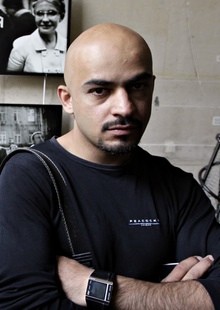 Mustafa Nayem. Photograph: Francois Mori/AP
Mustafa Nayem. Photograph: Francois Mori/AP
The man who began this revolution is Mustafa Nayem, a well-known
Ukrainian journalist. Last November he put a question on Facebook.
Yanukovych had just announced that he was dumping Ukraine's preparations
to sign an association agreement with the European Union. Instead he
was turning to Russia. Nayem – an investigative reporter born in
Afghanistan – asked: was anyone planning to go to the Maidan? "In one
hour my post had more than 1,000 'likes'. That night 400 people showed
up. They stayed until 6am. Most of them were my friends from Facebook.
It was the so-called creative class," he said.
This mass street
protest
went through several iterations, he explained. For weeks it was
peaceful. Later, the government used brutal force; in the final hours of
the regime, suspected pro-government snipers killed dozens. Eleven
police died too.
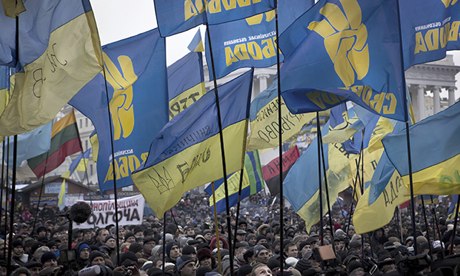 Protesters in Independence Square in December, after talks between
opposition leaders and Viktor Yanukovych. Photograph: Etienne De
Malglaive/Getty Images
Protesters in Independence Square in December, after talks between
opposition leaders and Viktor Yanukovych. Photograph: Etienne De
Malglaive/Getty Images
One of the organisations that participated in the revolution was
Pravy Sektor ("Right Sector"). They are now camped out at the bottom of
the Maidan, in the four-star Hotel Dnipro. Their red and black flag
flies above several of the tents in Kiev's sprawling downtown protest
city; young volunteers – unarmed but wearing khaki fatigues – have
commandeered a boutique and a city council office. The Kremlin points to
Right Sector as proof that what happened in Kiev was an
ultranationalist takeover.
Right Sector's deputy leader, Andriy
Tarasenko, told the Guardian his organisation didn't want to be involved
in post-revolutionary party politics. Rather, he said, it sought to
"transform the relationship between people and power". What this meant
was a little unclear. He also wanted Kiev's new interim government to
introduce a law that would allow his members to carry arms. "In
Switzerland, everyone has the right to carry a gun," he said. Is Right
Sector fascist? "Putin is the fascist. He's the occupier," he replied.
Tarasenko
denied his organisation was antisemitic. "I met with the Israeli
ambassador. We had absolutely normal relations. We want to trade with
Israel," he said. What would happen if Russia went to war with Ukraine,
an increasingly likely prospect? "We're ready to fight for our land," he
replied. Nearby, on the hotel's fifth floor, a couple of recruits were
waiting to join up at a "mobilisation" point.
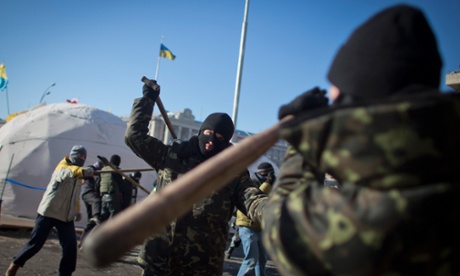 Members of the radical group Right Sector practising street fighting in Kiev. Photograph: Darko Bandic/AP
Members of the radical group Right Sector practising street fighting in Kiev. Photograph: Darko Bandic/AP
The group's far-right proclivities are obvious. Some of its
footsoldiers dress entirely in black, with military style buzz-cuts.
What is less sure is whether Right Sector amounts to a serious political
force. None of its members died in last month's unrest, fuelling claims
the umbrella movement is guilty of romantic paramilitary play-acting as
well as incoherence.
"They're not fascists. They're peasants,"
the hotel's black Angolan doorman, Claudio Miguel, said witheringly of
his shadowy guests. He added: "They don't come from Kiev. They're from
faraway villages."
Olexiy Haran, a politics professor and a member
of the Maidan's organising committee, expressed exasperation at the way
the Kremlin's "fascist" trope had taken root in some western minds.
"I've had liberal Harvard professors asking me about this. We are
talking traditional Russian propaganda," he said.
Haran
characterised the events of the tumultuous past three months as a
"national liberation and anti-corruption movement". It was pro-decency,
and opposed to a president who behaved "like a puppet of Russia", he
said.
In a statement,
Haran and other academic experts on post-Soviet Ukrainian radicalism
point to the heterogeneous nature of the protest movement – a "confusing
mosaic" made up of people with "different motivations, backgrounds and
aims". Most of the protesters "only turned violent in response to
increasing police ferocity and the radicalisation of Yanukovych's
regime," they write.
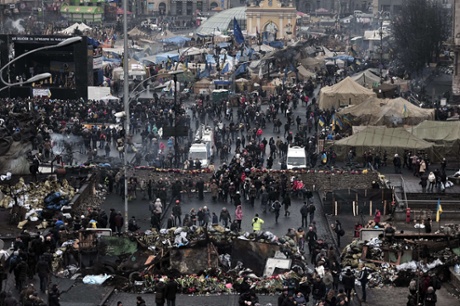 Thousands of Ukrainians visit memorials in Independence Square in February. Photograph: Louisa Gouliamaki/AFP/Getty Images
Thousands of Ukrainians visit memorials in Independence Square in February. Photograph: Louisa Gouliamaki/AFP/Getty Images
The experts complain of a "dangerous tendency" to misinterpret what
happened. Exaggerated reports of ultra-nationalist actors ultimately
serve "Russian imperialism", they suggest.
For Haran, it has been a
bruising few months. Before the uprising, critics of the regime started
to disappear, only for their bodies to be found dumped in forests. The
professor would take a hammer with him to protests at the Maidan, as
well as an orange helmet and a gas mask. (He never used the hammer.)
Sitting
at his home in Kiev's high-rise suburbs, he looked exhausted and strung
out. He dismissed Sunday's poll in Crimea as a "pseudo-referendum". If
Russian troops continued their military advance, Ukrainian forces would
have to fight back, he said.
Haran said the rise of "territorial
nationalists" – different from ethno-nationalists, who insist on race
distinctions – must be understood in the context of Ukraine's recent
history. But there is an older backstory too: Stepan Bandera, a hero to
Ukrainian nationalists, collaborated with the Nazis during the second
world war in an attempt to create an independent Ukrainian state. The
Nazis subsequently arrested him and his associates. Moscow has thus
dubbed the Maidan activists "Banderovtsy": followers of Bandera.
More
recently, Yanukovych's Russification policies set off a
counter-reaction and bumped up the popularity of Svoboda ("Freedom") – a
radical Ukrainian nationalist party that enjoys support in the west of
the country, particularly in Galicia, and polled over 10% in the 2012
elections – winning 38 seats in the 450-strong parliament. Led by Oleh
Tyahnybok, Svoboda is now part of Ukraine's government, holding four
cabinet positions, including deputy prime minister.
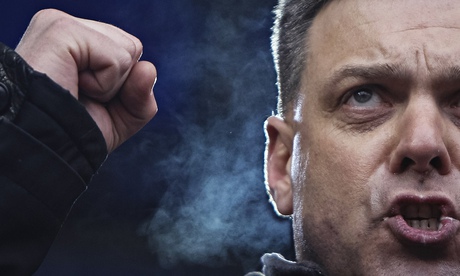 Oleh Tyahnybok, leader of the radical Ukrainian nationalist party
Svoboda, at an anti-government rally in Kiev in February. Photograph:
Gleb Garanich/Reuters
Oleh Tyahnybok, leader of the radical Ukrainian nationalist party
Svoboda, at an anti-government rally in Kiev in February. Photograph:
Gleb Garanich/Reuters
The party's neofascist past is clear. Founded in 1991 as an
anti-Communist movement, Svoboda was previously called the
Socio-National Party of Ukraine – a nod to national socialism. Its
symbol was Nazi too: a swastika-like Wolfsangel. Tyahnybok dumped the
Hitler paraphernalia when he renamed the party Svoboda in 2004, on
becoming leader. The same year, however, he was ejected from the
mainstream Our Ukraine faction after referring to the "Muscovite-Jewish
mafia".
Over the past decade the party appears to have mellowed,
eschewing xenophobia, academic commentators suggest. On Monday, the US
ambassador in Kiev, Geoffrey Pyatt, said he had been "positively
impressed" by Svoboda's evolution in opposition and by its behaviour in
the Rada, Ukraine's parliament. "They have demonstrated their democratic
bona fides," the ambassador asserted. Svoboda played a leading role in
the revolution; 18 of its members were shot dead. Another deputy prime
minister in the new government, meanwhile, is Jewish.
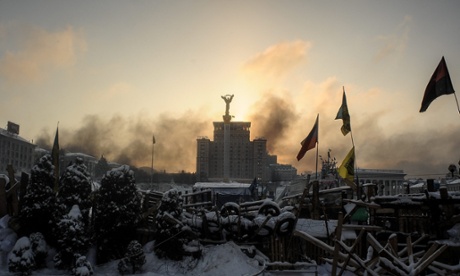 The sun rises above an anti-government protesters' camp in Independence Square in January. Photograph: Roman Pilipey/EPA
The sun rises above an anti-government protesters' camp in Independence Square in January. Photograph: Roman Pilipey/EPA
Ukraine's chief rabbi, Moshe Reuven Azman, told the Guardian there
has been no evidence of an antisemitic backlash, either before or after
the revolution. The main synagogue in Kiev, a few hundred metres from
the Maidan, was untouched, he said. Israeli volunteers had treated some
of the wounded. Asked what he thought of Right Sector, he replied: "I
haven't read their programme." He went on: "I've been in touch with
Jewish communities across Ukraine. Nobody told us of antisemitic
statements."
Nayem, Haran and others in Kiev argue that the
Kremlin's description of a neo-Nazi power-grab is unfounded. A better
critique, they say, is that the politicians now in charge are from the
same political class that has failed Ukraine in the past, and that the
Russian-speaking east of the country – Yanukovych's heartland, bordering
Russia – is under-represented.
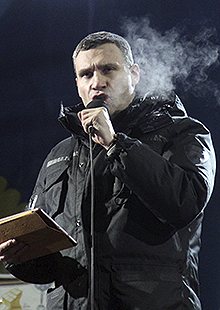 Vitali Klitschko. Photograph: Zurab Kurtsikidze/EPA
Vitali Klitschko. Photograph: Zurab Kurtsikidze/EPA
The new, emergency government is made up of former opposition
politicians from two parties - Yulia Tymoshenko's centre-right
Batkivshchyna and Svoboda. A third opposition party, Udar, led by
former boxing champion Vitali Klitschko, supports from outside. Maidan
activists fill some posts. Yanukovych's Party of Regions, meanwhile, has
disavowed its vanished leader and gone into opposition.
Ukraine's
new prime minister is Arseniy Yatsenyuk – in Washington on Wednesday to
meet with President Obama. Yatsenyuk is an English-speaking lawyer and
economist. Observers say he is smart, if not exactly charismatic. His
chief drawback is that he is a protege of Tymoshenko, who led Ukraine's
2004 Orange Revolution only to subsequently destroy it as prime
minister. In 2010 Yanukovych swept back as president in democratic
elections, and threw Tymoshenko in jail.
The government thus far
has sought to distinguish itself from its predecessor. The early signs
have been encouraging. Pavel Sheremeta took the metro to work for his
first day as economics minister. ("Still alive and kicking", he posted
afterwards.) Ukraine's delegation flew to Washington on a commercial
flight. The country is, after all, broke. And the new defence minister
Arsen Avakov announced via Facebook that Russian troops had illegally
entered Crimea.
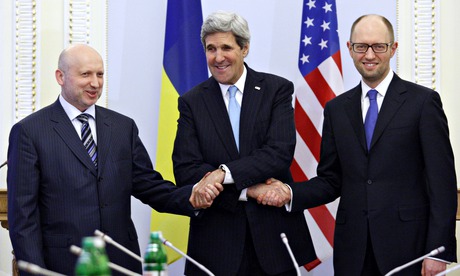 John Kerry shakes hands with Ukraine's interim president Oleksandr
Turchynov and prime minister Arseniy Yatsenyuk. Photograph: Yury
Kirnichny/AFP/Getty Images
John Kerry shakes hands with Ukraine's interim president Oleksandr
Turchynov and prime minister Arseniy Yatsenyuk. Photograph: Yury
Kirnichny/AFP/Getty Images
The interim government – in power until 25 May, when new presidential
elections will be held – has made some mistakes, however. Acting
president Oleksandr Turchynov – another Tymoshenko ally, known as a
smooth parliamentary operator – was forced to veto an attempt to
downgrade the status of the Russian language.
The language issue
is fraught. The pro-Russian faction of the Party of the Regions pushed
for Russian to be an ethnic minority language. In 2012, Yanukovych
signed this into law but, critics say, used unconstitutional means to do
so. Some in the new government wanted to reverse this. Ukrainian
remains the state language; the right to speak Russian is guaranteed.
Nervous
European diplomats wonder what will happen next. One, from an EU nation
bordering Russia, talked scathingly of the Kremlin's anti-Kiev
information war. "The Russian propaganda machine has been switched to
maximum," he said. "They have activated every agent of influence."
Russian-speakers in Ukraine were getting calls from relatives in Russia,
who watched state TV channels and told them "you've been occupied by
fascists and terrorists," he said. "Those in Ukraine answered: 'There's
nothing going on here'."
Unless the west took a tough stance, the diplomat argued, Putin would continue to rip up the map of
Europe,
once he had annexed Crimea. "If any country in Europe is close to a
classical fascist state it's Russia," he said. "You behave like a
fascist and blame the other side for fascism. You are always meddling in
someone's internal affairs and you accuse the west of that. Even Serbia
has advanced from this.'
Back in the Maidan, families placed
candles and icons next to photos of the dead. Ukraine's capital is back
to normal. Most revolutionaries have gone home. The subway works, shops
and restaurants have reopened, and the guards outside the US
ambassador's residence have put on their police uniforms again. Those
still camped out on the Maidan – a motley group of middle-aged men and
spotty teenagers – appear not to have a great deal to do.
 - Vi har
allerede gjort om den ene sittetribunen på kortsiden til ståtribune for å
få inn 1000 ekstra tilskuere. Dermed er antall tilskuere økt fra 6000
til 7000. Da er også ståplassene på langsiden tatt med. Flere mennesker
får vi rett og slett ikke plass til, sier daglig leder i Region Sørvest,
Erik Andersen til Aftenbladet.
- Vi har
allerede gjort om den ene sittetribunen på kortsiden til ståtribune for å
få inn 1000 ekstra tilskuere. Dermed er antall tilskuere økt fra 6000
til 7000. Da er også ståplassene på langsiden tatt med. Flere mennesker
får vi rett og slett ikke plass til, sier daglig leder i Region Sørvest,
Erik Andersen til Aftenbladet.

